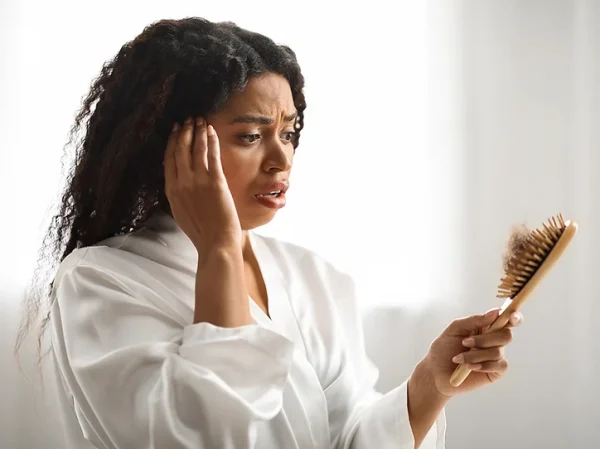
When Does Postpartum Hair Loss Stop
Postpartum hair loss, scientifically called telogen effluvium, is a temporary condition that affects many new mothers. It occurs as a result of hormonal shifts after giving birth and is a natural part of the postpartum experience. While it may feel alarming to see more hair than usual falling out, it is rarely a cause for concern and typically resolves on its own. When does postpartum hair loss stop? This blogpost will tell you everything you need to know about postpartum hair loss and how to manage it.
What Causes Postpartum Hair Loss?
During pregnancy, your hair likely felt fuller and thicker thanks to elevated estrogen levels. This hormone keeps more hair in its growth phase, meaning you shed less than usual. After giving birth, estrogen levels drop, and the hair that would have shed during pregnancy enters the resting (telogen) phase. About 2-4 months postpartum, this hair begins to fall out, leading to noticeable shedding.
This phenomenon, called telogen effluvium, isn’t permanent hair loss. It’s your body’s way of “catching up” on normal shedding that was delayed during pregnancy.
How Long Does It Last?
For most women, postpartum hair loss peaks around 4-6 months postpartum and typically subsides by the time the baby is 12 months old. By this point, hair growth patterns usually return to normal as the body’s hormonal balance stabilizes. However, some women may experience prolonged shedding, especially if they have underlying health conditions such as thyroid imbalances or nutritional deficiencies.
Tips to Manage Postpartum Hair Loss
While you cannot completely prevent postpartum hair loss, you can take steps to support your hair health during this time:
- Maintain a Balanced Diet: Focus on nutrients essential for hair health, such as iron, zinc, biotin, and vitamins A, C, D, and E.
- Be Gentle with Your Hair: Avoid tight hairstyles, heat styling, and harsh chemical treatments that can exacerbate hair loss.
- Use Volumizing Hair Products: These can make hair appear fuller and help you feel more confident during shedding.
- Consider Supplements: If your diet lacks specific nutrients, supplements (like biotin) may help, but consult your doctor first.
- Talk to a Healthcare Provider: If hair loss persists beyond a year or is accompanied by other symptoms (e.g., fatigue or weight changes), it may indicate an underlying issue such as postpartum thyroiditis.
When to See a Doctor
If your hair loss persists beyond a year, is extremely severe, or comes with other symptoms like fatigue, weight changes, or scalp irritation, it’s worth discussing with your doctor. Conditions like thyroid imbalances (common postpartum) or nutrient deficiencies could be contributing to prolonged shedding.
Frequently Asked Questions About When Does Postpartum Hair Loss Stop
1. When does postpartum hair loss typically start?
Postpartum hair loss often begins around 2-4 months after childbirth. It occurs as your hormone levels, especially estrogen, drop back to pre-pregnancy levels, allowing hair that was in the growth phase during pregnancy to shed.
2. How long does postpartum hair loss last?
For most women, postpartum hair loss peaks between 4-6 months postpartum and resolves by the time the baby is 12 months old. However, the duration may vary based on individual factors such as stress levels, diet, and overall health.
3. Does everyone experience postpartum hair loss?
Not every new mother will experience noticeable hair loss, but it is a common condition. Depending on genetics, hormone levels, and lifestyle factors, some may shed more hair than others.
4. Can breastfeeding prolong postpartum hair loss?
There is no strong evidence that breastfeeding significantly prolongs postpartum hair loss. However, hormonal fluctuations can differ in breastfeeding mothers, potentially influencing the timing and extent of hair shedding.
5. What can I do to reduce postpartum hair loss?
While you can’t completely prevent it, you can manage postpartum hair loss by:
- Eating a balanced diet rich in vitamins like biotin, zinc, and iron.
- Avoiding harsh hairstyles or treatments that put stress on your hair.
- Using volumizing shampoos and conditioners to make hair look fuller.
6. Is postpartum hair loss permanent?
No, postpartum hair loss is not permanent. It’s a temporary phase that resolves naturally as your body adjusts. Most women regain their normal hair thickness within a year.
7. Should I be concerned if my hair loss is excessive?
Consult a healthcare provider if you’re experiencing severe or prolonged hair loss beyond a year or noticing bald spots. Conditions like postpartum thyroiditis or nutrient deficiencies could be contributing factors.
8. Can hair growth treatments help?
Over-the-counter treatments like minoxidil or natural remedies like scalp massages may help stimulate hair regrowth. However, always check with a doctor before starting any treatment, especially if breastfeeding.
9. Does postpartum hair loss affect hair texture?
Some women notice changes in hair texture postpartum, such as dryness, increased oiliness, or changes in curl pattern. These changes are temporary and often resolve as hormone levels stabilize.
10. Can postpartum hair loss happen after a miscarriage or stillbirth?
Yes, postpartum hair loss can occur after any significant hormonal shift related to pregnancy, including miscarriage or stillbirth.
If you have concerns about postpartum hair loss or its duration, speaking with a healthcare provider can help rule out underlying issues and provide tailored advice.
Conclusion
Postpartum hair loss is a natural and temporary process. Most new moms will notice their hair returning to its normal cycle within 6-12 months. In the meantime, prioritize gentle care and proper nutrition to support your hair health. If you’re feeling particularly worried, consulting with a healthcare provider can provide reassurance and solutions tailored to your needs. Remember, this phase is temporary, and your hair (and body) will recover as your hormones stabilize.


Leave a Reply